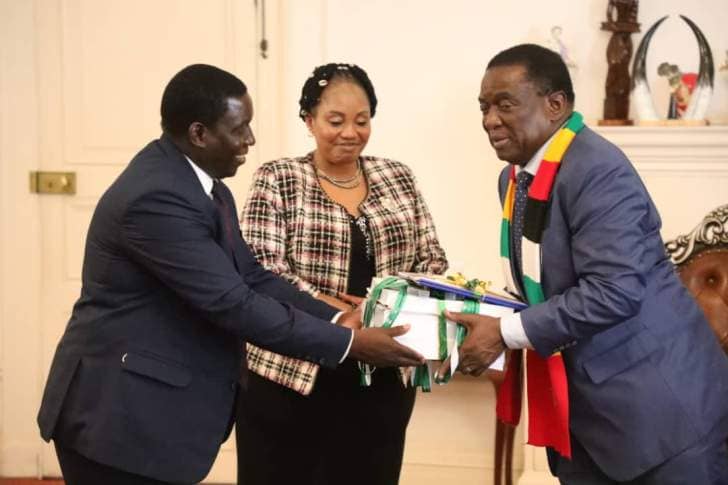ZEC incapable of running free and fair elections

ZEC officials including Priscilla Chigumba and President Mnangagwa
A NEW study on Zimbabwe’s electoral politics, processes and institutions has found that the Zimbabwe Electoral Commission (Zec) is deeply distrusted by voters, hence cannot be trusted to preside over free, fair, transparent, credible and legitimate elections.
The new study titled Electoral Politics in Zimbabwe, Volume I: The 2023 Election and Beyond, edited by local academics Esther Mavengano and Sophia Chirongoma, says Zec is captured, compromised and unfit to hold free and fair elections.
Says the study: “The most important factor in ensuring credible elections in Zimbabwe is by promoting a transparent Independent Commission.
“There is no way elections can be free and fair, while the commission is accused of being aligned with the ruling party, State President and Constitutional Court.
“Zimbabwe needs an independent electoral commission that is ready to uphold the fundamental principles of democracy and rule of law. Zec should be independent from the Government of Zimbabwe, political parties or individuals or groups interested in election results.”
As a result of Zec’s partisan role, dysfunctionality and incompetence, the 23 August general elections are likely to be disputed again.
Elections in Zimbabwe have since 2000 been disputed due to Zec’s professional and operational failures, irregularities, coercion, violence and manipulation.
The study says: “The 2023 Zimbabwean elections could witness another sad electoral history of having disputed elections and accusation of rigging unless Zec presents transparency in its handling of the elections to the satisfaction of the electorate.
“The Government of Zimbabwe should ensure Zec is allocated adequate funding to initiate the voter registration and election preparations in time.
“The commission should have financial independence after the annual budget is announced so as to promote effectiveness of its performance and independence.
“The prevailing economic and political environment in Zimbabwe po ints to a very volatile election in 2023 if the government does not put a conducive environment in place.”
The research also says there is a need for professional and impartial resolution of electoral disputes by the judiciary.
“In addition, the government and the judiciary should remain independent to harmonise jurisdictions arising from elections disputes.”
The study recommends that political parties and civil society continuously deploy agents to be trained by Zec to support its efforts and advance transparency.
Further, there should be research on the role of political actors in analysing the independence of Zec, it says.
“International organisations such as the European Union should also continue to support electoral processes so as to enhance and promote transparency in elections. Local and international observers should continue monitoring the electoral environment to boost citizens’ confidence in the electoral process.”
The study brings more insight into what voters think about Zec.
“The research findings presented that Zec is responsible for conducting free, fair and transparent elections. All the participants acknowledged that it is the responsibility of Zec to conduct free and fair elections. “However, some of the participants cited that the commission is failing to generate uncontested election results giving reference to the case of Chamisa v. Mnangagwa constitutional petition after the 2018 elections,” the study says.
It goes on: “Respondent 2 said that ‘the Zimbabwean elections, since the inception of Zec in 2004 have been contested for their credibility’. All the participants expressed that Zec is not really performing its duty when there are always issues on the credibility of election results and the voters’ register.
“The research findings also revealed that Zec is responsible for designing, printing and distributing ballot papers to polling centres.
“However, due to hard copies, the visually impaired people fail to have equal access to the resource materials, therefore failing to cater to the needs of some disadvantaged members of the community.”
Further, the study, says: “Respondent 14 expressed concern over the provision of braille material, an issue that has long been petitioned before the Commission to address. The participants further expressed that Zimbabwe has 16 official languages, and as such should be the case on voter education information dissemination toward promoting principles of democracy. During the interview discussions, issues arose pertaining to the financial capability of the commission to conduct voter education and print materials in diverse languages in all mass media.”
The research also focuses on Zec’s other role and activities.
“Participants acknowledged the role of Zec in promoting voter education on social media and press. The study found out that Zec made use of media such as newspapers, radio and internet in voter education. Respondent 12 expressed that, ‘radio has the potential of wide coverage, however, we must not forget fellow citizens who are deaf.’ The study presents that there is no adequate decentralisation of vital information such as voter registration and voting to disabled people such as those with hearing impairment.”
The research findings also revealed that Zec should really strengthen its voter registration process. Most of the participants expressed concern that despite Zimbabwe having elections since 1980, there are citizens who do not even know the requirements needed to register to vote.
“The crucial question to ask is, are those people even aware of the biometric voter registration system?” it says.
“During the interview discussions, only one participant expressed that she was not aware that the Zimbabwe Electoral Commission is responsible for maintaining the biometric voters’ register. The respondent expressed that ‘I do not even know that Zec is responsible for voter registration…..what is BVR………what is the difference between Zec and the Government of Zimbabwe?”
The research also found out voter education ought to be taken seriously in order to eradicate confusion and misunderstandings from the citizens concerning the electoral commission and the government.
An interesting finding was that most of the participants were aware of the Biometric Voter Registration.
The research findings also revealed that Zec is responsible for promoting digital technology in elections.
Digital technology is also important in the conduct of elections to ensure credibility and transparency. According to Respondent 1, the manual vote register has been used by the Zimbabwe government since 1980 elections except recently in the 2018 elections when biometric voter registration was adopted.
The respondent further indicated that the challenges of having an updated voters’ register in past elections, including the 2013 elections, led to the outcry for a biometric voter registration system.
“Respondent 3 expressed that manual voter registration used in previous elections was a slow process, associated with long queues at the Registrar-General. By removing the deceased voters from the voters’ list and adding new registrants, the Registrar-General was required to update the voters’ list, which was not always the case,” the study says.
“The Zimbabwe Electoral Act Chapter 2:13 has the mandate for registering, transferring and removals of the dead from the voters’ roll. Most of the participants further highlighted that during the 2013 elections, there were accusations of electors’ slips being used to vote whose foundation could not be discovered.
“The research findings implied that the participants praised Zec as most of the participants acknowledged that the manual voter registration process acted as a major barrier to voter turnout leading to an inaccurate voters’ register.”
The study found that despite technology in the voters’ registration process, manual paper registrations were not totally scratched off from the process.
“Respondent 5 highlighted that besides the biometric voters’ registration system, Zec also employed a registration and data verification process on paperwork which was done manually.
“However, Respondent 6 indicated that: Voter registration exercise remains a crucial and indispensable process in the electoral cycle in Zimbabwe because in most countries, including Zimbabwe itself, only those who are registered to vote ultimately participate on the Election Day.”
The principles of transparency and accountability could be ensured by a system of biometric voter registration.
The study also found out that the manual voters’ register was being manipulated by the late former president Robert Mugabe and Zanu PF.
The participants expressed that Zanu PF has been controlling the manual vote register to its benefit so that the party wins in all the elections. Respondent seven argued that the manual voters’ roll contained several ghost voters who were not removed from the voters’ list. The participant further highlighted that Zanu PF controlled the vote register so that it can pave way for multiple voting.
“Another interesting finding was that the voter registration process in the urban areas was not as strict as it was in the rural areas. The participants expressed that at times the Zec registration teams would either open late or close too early.
“Revealing the foe side of Zec, Respondent 11 expressed that at one point, Zec could not release the manual voters’ roll when it was being asked for it.
“The participants’ argument was based on the fact that in the case of Dabengwa vs. chairperson of Zec and two others, the voters’ roll was not accessible. Dabengwa had asked for the electronic voters’ roll in 2012, unfortunately Zec failed to cooperate. The participant further stated that the Zimbabwe Lawyers for Human Rights even asked for the voters’ roll before voter registration commenced and the voters’ register could not be accessed upon request as it was not up to date.
“Most of the study participants also noted that the manual vote register was not best fit for Zimbabwe elections. When asked if the Biometric technology has made a difference in the 2018 election results, most of the respondents were of the view that the biometric devices improved the credibility of elections as the biometric machines reduced multiple voting. Respondent 10 said that the biometric voter registration system is also capable of promoting peaceful and credible elections in the forthcoming 2023 harmonised elections.
“However, another participant expressed that while both domestic and international observers praised the 2018 elections as free and fair, there were several problems and obstacles that called into doubt the legitimacy and integrity of the results.
“A post-election audit conducted by several parties uncovered evidence of irregularities, technological failures and election officials’ willful cooperation in the overall conduct of the elections.”
Some of the study participants also argued that neither the regulatory nor the administrative framework for electoral management body were able to ensure genuine elections, even with the presence of the biometric voter registration.






